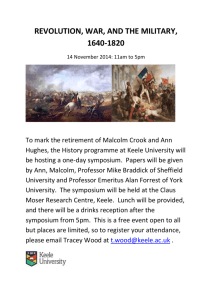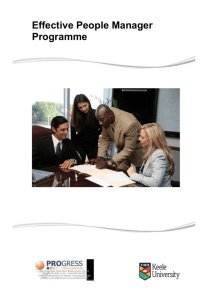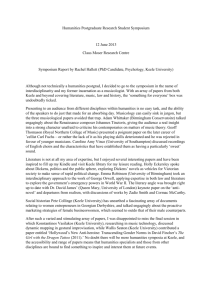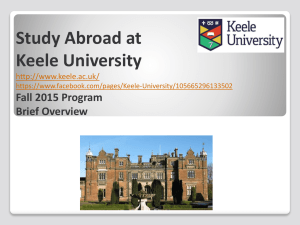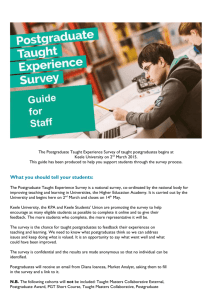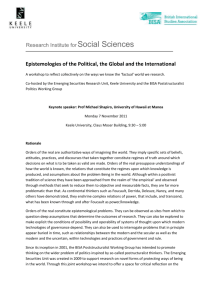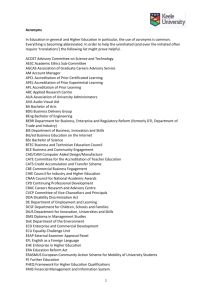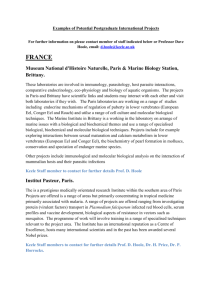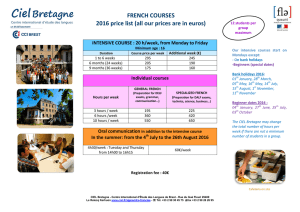Innovation Projects
advertisement
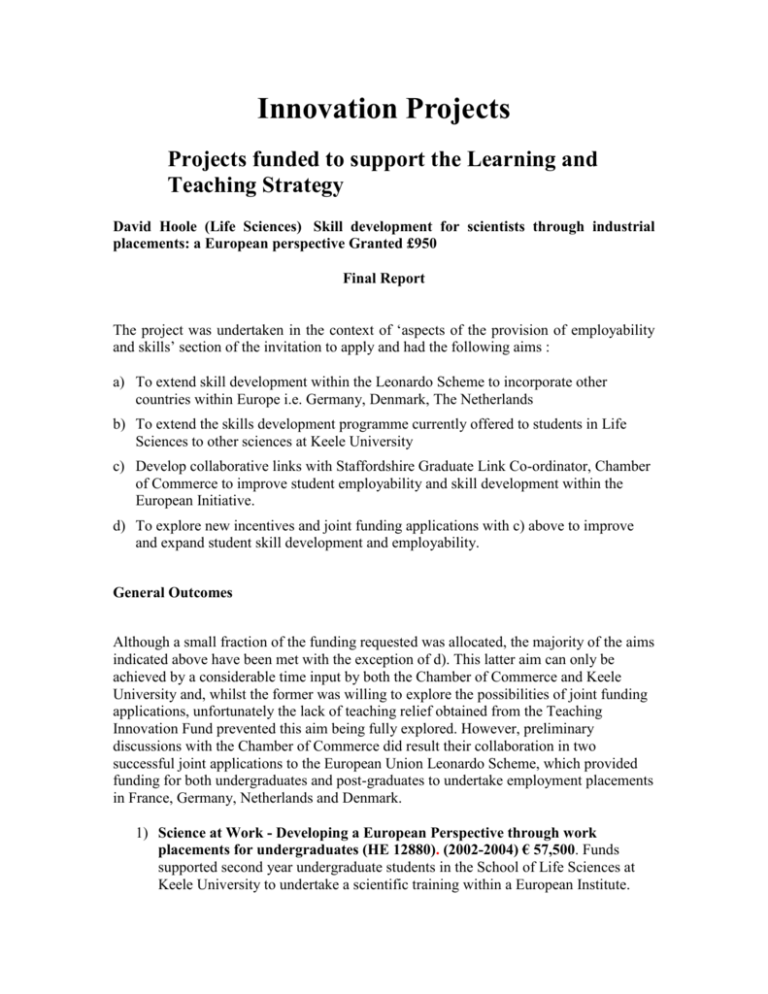
Innovation Projects Projects funded to support the Learning and Teaching Strategy David Hoole (Life Sciences) Skill development for scientists through industrial placements: a European perspective Granted £950 Final Report The project was undertaken in the context of ‘aspects of the provision of employability and skills’ section of the invitation to apply and had the following aims : a) To extend skill development within the Leonardo Scheme to incorporate other countries within Europe i.e. Germany, Denmark, The Netherlands b) To extend the skills development programme currently offered to students in Life Sciences to other sciences at Keele University c) Develop collaborative links with Staffordshire Graduate Link Co-ordinator, Chamber of Commerce to improve student employability and skill development within the European Initiative. d) To explore new incentives and joint funding applications with c) above to improve and expand student skill development and employability. General Outcomes Although a small fraction of the funding requested was allocated, the majority of the aims indicated above have been met with the exception of d). This latter aim can only be achieved by a considerable time input by both the Chamber of Commerce and Keele University and, whilst the former was willing to explore the possibilities of joint funding applications, unfortunately the lack of teaching relief obtained from the Teaching Innovation Fund prevented this aim being fully explored. However, preliminary discussions with the Chamber of Commerce did result their collaboration in two successful joint applications to the European Union Leonardo Scheme, which provided funding for both undergraduates and post-graduates to undertake employment placements in France, Germany, Netherlands and Denmark. 1) Science at Work - Developing a European Perspective through work placements for undergraduates (HE 12880). (2002-2004) € 57,500. Funds supported second year undergraduate students in the School of Life Sciences at Keele University to undertake a scientific training within a European Institute. 2) Science at Work (2002-2004) (YW 128709) €57,500. Funding for graduate students either from the School of Life Sciences at Keele University or graduates from other UK Universities whose home residence is in the West Midlands to undertake young person scientific training in Europe Both awards provide financial support for 10 beneficiaries to undertake training for approx. 40 weeks in Europe. Each student receives a grant of 5,000 Euros, the rest of the grant is to support preparatory language and cultural training, administration and tutoring. A commitment to support this initiative was obtained from several host institutes in Europe and contractual agreements between Keele University and each of the following host institutions was agreed : Institutes : 1) Laboratoire de Physiologie, Museum National d’Histoire Naturelle, 7 rue Cuvier, 75231 Paris, Cedex 05, France 2) Station de Biologie Marine, Museum National de Histoire Naturelle, BP225, 29182 Concarneau, Cedex, France 3) Institut Pasteur de Lille, Centre d'Immunologie et de Biologie Parasitaire, 1 rue du Professeur A Calmette, BP245, 59019 Lille, France 4) Unité de Biologie des Interactions Hôte-Parasite, Institut Pasteur, 25-28 rue du Docteur Roux, 75724 Paris, Cedex 15, France 5) Centre de Biologie du Développement, Bâtiment iv r3, Université Paul Sabatier Toulouse III, 118 Route de Narbonne, 31062 Toulouse, Cedex 4, France 6) Laboratoire de Parasitologie, 163 rue August Broussonet, 34090 Montpellier, France 7) Department of Ecology and Ecophysiology, Catholic University of Nijmegen, Toernooiveld 1, 6500 Gl Nijmegan, The Netherlands 8) Cell Biology and Immunology Research Group, Department of Animal Sciences, Wageningen University, PO Box 338, 6700 Ah Wageneingen, The Netherlands 9) Laboratory of Fish Diseases, Department of Veterinary Microbiology, The Royal Veterinary and Agricultural University Frederiksberg, Denmark 10) Fish Disease Research Unit, School of Veterinary Medicine, PO Box 71 11 80, 30545 Hannover, Germany The subject area of the research training received by the students was dependent upon the host institution. Students worked as laboratory research assistants and were integrated into the post-graduate training programmes of the host. Host institutes supplied a named tutor and complied with European Health and Safety Regulations. All students were required to take out personal accident and health insurance arranged through Keele University. The Course Director, Dr. D. Hoole, was in regular e mail contact with the student and host tutor and made one visit to the host institute during the period of the student’s training and met with the students when they returned to the UK on national holidays. The project successfully achieved several learning aims and outcomes : Learning Aims: The key aims of the project were to enhance the employment prospects of beneficiaries in science by helping them to develop and improve their scientific, laboratory and generic skills and competencies with a view to enhancing employability, and facilitating their integration, or reintegration, into working life. The project also provided basic skills in vocational and education training through the students' work programmes and the adoption of the University’s 'Realise' scheme. In addition, all students received European Union scientific training accreditation through the award of the ‘Europass’. Learning outcomes: The learning outcomes of the project meant that by the end of the training period students: - were able to record and reflect on skills and learning from the placement through the "Realise" scheme - obtained European-wide recognition of the period of training through Europass - had developed scientific skills and knowledge, and transferable skills, in a workplace setting (e.g. interpersonal skills, team-working, time management, problem solving etc) - had received training in the use of the latest laboratory technology - were able to use new and innovative bio-medical and bio-technical techniques in a hands on fashion - had developed language skills appropriate to their host country, including scientific vocabulary Dissemination of the results of the project This was achieved at a number of levels: At the Institutional – the Leonardo Scheme is included in the School of Life Sciences' newsletter, which is sent out to existing and prospective students and is also include on the website of both the School of Life Sciences and Centre for International Exchange and Languages (CIEL). In addition, the Careers Department were informed of the scheme and, with their help, appropriate details were sent out to other UK universities to recruit graduate students. The student assessment of the scheme was disseminated through the CIEL News Letter Volume 6 Number 2 p26-28 and through presentations given by the beneficiaries of the scheme to their fellow students i.e. first year Life Scientists. Academic staff in Life Sciences were informed of the scheme through the Teaching and Learning Committee and appropriate Course Teaching Committees. In addition, the scheme was discussed in detail with the Deans of Natural Sciences and Humanities, Professors Jones and Crook. At the National/International level : several students have been informed that they will be included as co-authors in publications appearing in scientific press and in conference proceedings. In addition, Dr. Annette Kratz (Head of CIEL) has presented the results at the Leonardo UK National Agency. Future Developments Future developments of the initiative are at an advance stage and are dependent on whether the beneficiaries are graduates or Keele University undergraduates 1) Keele University undergraduates. A further grant application has recently been submitted to the European Union which has requested € 40,400 to support scientific training for seven students in Poland, in addition to collaborations with institutes in France, Germany and the Netherlands. 2) Graduates Initial attempts to obtain appropriate FTE funded recognition and Keele University academic accreditation for beneficiaries undertaking scientific training through a European Union funded placement were unsuccessful. The proposed ‘Postgraduate Certificate in European Scientific Research Training’ was to be offered through the School of Life Sciences and Continuing and Professional Education (CPE) and included the following tutors: Course Director : Dr. D. Hoole (School of Life Sciences); Administration Director : Dr. A. Kratz (CIEL), Registration Director : Dr. M. Whittaker (CPE), Regional Recruitment Director : L. Challinor (North Staffordshire Chamber of Commerce). Although supported by staff within the School of Life Sciences and CIEL and the appropriate Deans, the Department of Academic Affairs rejected the proposal based on quality assurance issues. Recently however the Leonardo Funding Scheme has been used as a basis for a proposal for a new MSc course with a provisional title: European Scientific Research Training (MERes).
